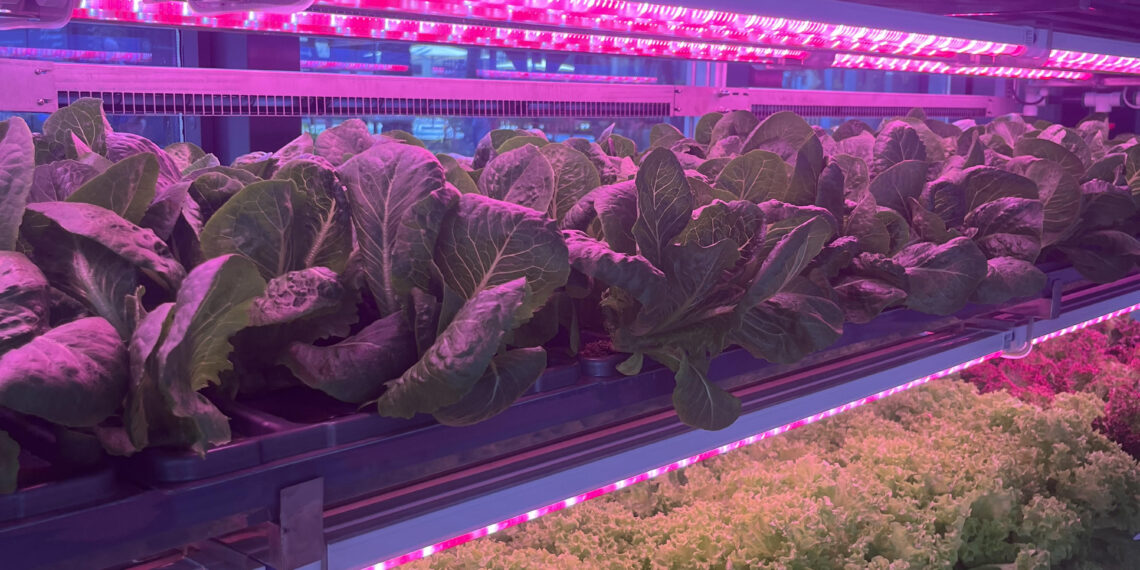Alesca Life, an indoor farming company, develops both vertical farms and precision agriculture solutions such as software and monitoring devices for customers who want to help their existing farms become more efficient.
The company which began in 2013 wants to localise farming, by bringing the farms closer to the homes. Their patented hardware systems, operational management software, monitoring and automation devices, and computer vision AI cameras help to monitor and grow plants.
“We are trying to shorten the supply chain,” said Stuart Oda, the Founder of Alesca Life Technologies during his talk in front of his farms at COP28 location in Dubai.
The company had two small exhibitions at COP28 site to show people what their farms and production look like.
Their turnkey vertical farms grow a variety of vegetables, through those indoor farms, using 90-99% less water, fertiliser, and land compared to traditional farms. The leafs are stacked like bunk beds, with the food exposed to LED lights.
The leafy products are then sold to different customers. However, Oda believes the prices remain higher than the traditional farming production which makes it a challenge.
“We want to rebuild the supply chain, we are proud of the technology that we have developed, to rebuild the whole supply chain,” Oda told his crowd. He explained further that by shortening the supply chain, people can reduce carbon emissions by up to 24%.
Alesca Life’s parent company is located in Singapore, however, it has operations in China, Japan, and the UAE.
Oda believes that 5 to 10% of the food by 2050 will be grown indoors, adding that indoor vertical farming compliments the lifestyle of the new generation that are looking to understand further how their food affects the environment.
During COP28, more than 150 countries signed the UAE Declaration on Agriculture, Food Systems, and Climate Action, which was launched by Indonesia President Joko Widodo on Dec 1.
The declaration pledges to strengthen food systems, build resilience to climate change, reduce global emissions, and contribute to the global fight against hunger.
“Even if you were able to fix the just energy transition and go completely renewable, you still wouldn’t be able to reach the 1.5 degrees if you don’t solve the food systems issue. That’s how big of a cause this is. Food systems will now be center stage in all future COPs,” said the H.E Mariam bint Mohammed Almheiri, UAE Minister of Climate Change and Environment and COP28 Food Systems Lead.
Indoor farming is viewed as a solution to agriculture’s emissions issue. The Middle East; for example, depends largely on importing food, therefore countries such as the UAE are invested heavily in indoor farming.
Food Tech Valley, a Dubai-based company, signed an agreement at the COP28 climate conference to develop a 900,000 square-foot “GigaFarm” that will grow 3 million kilograms of food per year. Within the site, there will be complementary technologies that will be co-located on the Dubai Food Tech Valley site as part of a closed-loop circular waste-to-value system, establishing a self-contained ecosystem designed to maximise resource efficiency and prevent any waste from going to landfill, the company said.
Not only in Dubai, but also during COP28, the UAE Presidency, FAO, the World Bank, CGIAR and the International Fund for Agricultural Development (IFAD) launched the Agrifood Sharm-El Sheikh Support Program which is a three-year program to facilitate dialogue and knowledge- sharing amongst global and regional policymakers.
“If we act urgently to transform our agrifood systems through the adoption of proven technologies and innovations, we can end hunger for all and grow prosperity within safe planetary boundaries. By pooling our efforts, we can support countries, namely in the global south, to develop and implement their national pathways based on science and evidence.Together, with science, we can,” said Ismahane Elouafi, Executive Managing Director, CGIAR.





